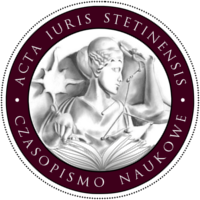






The journal applies procedures ensuring originality of scholarly publications using antiplagiarism software.
The system (System Antyplagiat) allows comparison of texts against resources of the most extensive database on the Polish market. The system is based on an antiplagiarism engine. It has access to the resources of the Internet, a database for legal acts containing updated normative acts in force in Poland and RefBooks, containing more than one million documents mainly in English and Polish from all fields of science and culture. The result of the analysis is prepared as a transparent report containing information about borrowings detected in the analysed text. The system meets all standards of privacy and confidentiality of data under applicable law and its effectiveness has been proven by hundreds of users.
Source: https://plagiat.pl/en/offer/education/#link-to-antiplagiarism
In order to maintain a high quality of published works and to foster and promote scholarly reliability the Editorial Team of Acta Iuris Stetinensis applies ethics procedures recommended by the Committee on Publication Ethics (COPE).
The journal employs procedures involving detection of scholarly dishonesty which is a serious violation of standards and norms of scholarly and academic integrity, compromising the author’s reliability and independence.
The COPE-recommended procedures address incidents of:
suspected redundant (duplicate) publication,
suspected plagiarism or self-plagiarism,
suspected fabricated data,
changes in authorship,
suspected ghost authorship (a significant contribution made to the publication, without revealing the contributor’s participation as one of the authors or without having his role mentioned in acknowledgments)
suspected guest or gift authorship (somebody’s contribution is negligible or none, and yet they included as an author in the publication)
reviewer suspecting undisclosed conflict of interests,
reader suspecting undisclosed conflict of interests,
editor suspecting an ethical problem with a submitted manuscript,
reviewer appropriating author’s ideas or data.
Source: https://publicationethics.org
Committee of Publication Ethics (COPE)
Ethical principles for the Editorial Team
The principle of liability:
The Editorial Team observes adopted procedures for the publishing process, especially those concerning the reviewing process (internal and external).
The Editors are responsible for implementing the principle of scholarly reliability, especially in counteracting scholarly dishonesty.
The decision on publishing a manuscript is made solely on the basis of its scholarly value, irrespective of Authors’ race, nationality, religion, gender or sexual orientation.
With cohesion of published texts in mind, the Editorial Team publishes corrections or errata should errors be noticed.
The Editorial Team is not allowed to use a rejected manuscript in any way without the Author’s consent.
The Editorial Team will reject or withdraw a manuscript on the basis of fully gathered documentation along with supporting evidence in the cases of scholarly misconduct or dishonesty referred to above as well as in the case of founded ethical reservations such as for example the lack of consent from an ethical committee, reservations concerning a patient’s consent and his protection, reservations concerning testing on animals etc.
In all cases of scholarly dishonesty, the Editorial Team shall notify the Author’s superiors or a person responsible for research and will publish a statement about withdrawing the publication. In incidents of plagiarism, the Editorial Team will inform the editor of the other journal implicated in the case or the publisher of the plagiarised book.
The principle of confidentiality - all manuscripts submitted to the Editorial Team and qualified for publication undergo the process of anonymous review.
Ethical principles for Authors
The principle of originality – the submitted manuscript must be original (it has not been published anywhere else before) and demonstrate appropriate citations. It is inadmissible for the same manuscript to be submitted to two different journals at the same time. The work must not be plagiarised or self-plagiarised and must not include false information.
The principle of authorship – the person who brought in significant substantive contribution to the manuscript (in research concept or interpretation) must be named as Author. When this contribution was modest the contributors should be named in Acknowledgements along with the description of the role of the supporting persons. Ghost and guest authorship is inadmissible. When multiple authors work on the paper the Corresponding Author informs of the contribution of individual Authors.
The principle of scholarly reliability – including reliability in informing about sources employed in the course of research. The Author shall notify the Editorial Team without delay about any errors or inaccuracies noticed in the text and shall work together with the Editorial Team in order to withdraw or correct the paper. The Author is obliged to name sources of funding for the publication and contribution of an institution (organization) in research (financial disclosure).
The principle of preventing conflicts of interest – the Author is obliged to name actual and potential conflicts of interest (financial and non-financial).
Ethical principles for Reviewers
The principle of objectivity and reliability of review – the assessment of a paper should be justifiable and based on the Reviewer’s own arguments. In the event of suspecting Author’s scholarly dishonesty, especially plagiarism, the Reviewer is obliged to notify Editor-in-Chief.
The principle of timeliness – a review should be delivered at a time specified by the Editorial Team and in the event of not being able to draw up the review the Editorial Team should be notified immediately.
The principle of confidentiality – reviews are written anonymously. The Author does not know the names of Reviewers and Reviewers do not know the Author’s name (the so-called double-blind review). Manuscripts are reviewed in confidentiality which means that the reviewer is not allowed to make it available to other persons except persons authorized by Editor-in-Chief.
The principle of preventing conflicts of interests – Reviewer will not review a manuscript if there is a conflict of interest between the Reviewer and the Author resulting from them working together or any other relationship with Authors. The Reviewer may not use a rejected manuscript without the Author’s consent.